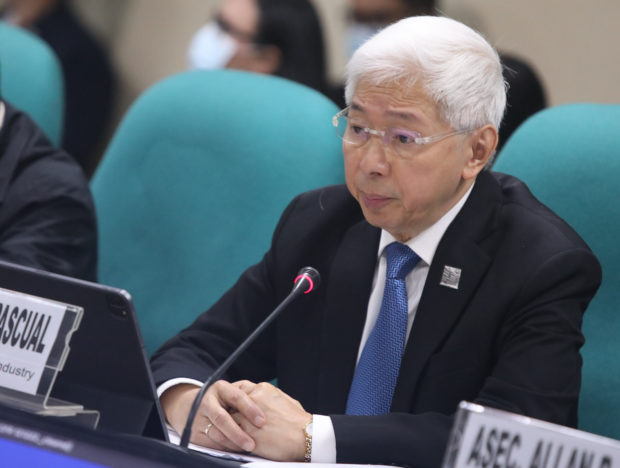
Department of Trade and Industry (DTI) Sec. Alfredo Pascual—Senate PRIB
Noting that the many holidays in the country have become “an issue” to the business sector, Trade Secretary Alfredo Pascual said he wants to limit the number of annual holidays to 10.
This means Filipinos would be limited to the 10 regular holidays that have been traditionally observed in the country—not counting All Saints’ Day and New Year’s Eve—if he were to have it his way.
But Pascual would also be defying his own boss, President Marcos, whose Proclamation No. 90 created at least two longer weekends for 2023.
Nevertheless, the trade chief said 10 annual holidays are generally what is followed by international organizations, such as the Asian Development Bank.
“That’s an issue—the number of holidays in the country. We’ve heard that expressed by business organizations,” he said in a forum on Wednesday held by the Management Association of the Philippines (MAP).
“This practice has been there for some time. As far as I am concerned, I want to limit the number of holidays to 10,” Pascual said.
‘Holiday economics’
Mr. Marcos’ proclamation, issued in November last year, adopts the 10 annual regular holidays of Jan. 1 (New Year’s Day), April 9 (“Araw ng Kagitingan,” or Day of Valor), Maundy Thursday (set this year on April 6), Good Friday (April 7), May 1 (Labor Day), June 12 (Independence Day), Aug. 28 (National Heroes Day, Nov. 30 (Bonifacio Day), Dec. 25 (Christmas Day) and Dec. 30 (Rizal Day).
The proclamation also continues to recognize, as special nonworking holidays, Feb. 25 (the 1986 Edsa People Power Revolution Anniversary), Black Saturday (which is on April 8 this year), Aug. 21 (Ninoy Aquino Day), Nov. 1 (All Saints’ Day), Dec. 8 (Feast of the Immaculate Concepcion) and Dec. 31 (New Year’s Eve).
Encourage travel
The President, however, also added Jan. 2 and Nov. 2 (All Souls’ Day) to the special nonworking holidays, and reset the Day of Valor, a Sunday, to April 10, thereby extending that weekend to one more day.
He cited “the principle of holiday economics wherein a longer weekend will help encourage domestic travel and increase tourism expenditures in the country.”
It was then President Gloria Macapagal-Arroyo who first introduced that policy in 2001.
But businesses that must continue operations during the holidays incur higher labor costs, due to the 200 percent of the daily wage for employees working on regular holidays, the additional 30 percent of their hourly rate, and the 30 percent of their daily wage on special noNworking holidays.
This year Mr. Marcos issued Proclamation No. 167 resetting to a day earlier the 1986 Edsa People Power Revolution anniversary on Feb. 25, thus also extending that weekend.
Muslim holidays
Since Arroyo’s time, the government has also been observing the Islamic feast days of Eid al-Fitr and Eid al-Adha as regular holidays.
Eid al-Fitr, the culmination of the holy month of Ramadan, was marked this year on Friday, for which the President had earlier issued Proclamation No. 201 declaring it a regular holiday.
Eid al-Adha, or the feast of Abraham’s sacrifice of his son Ishmael, will be celebrated sometime late June, in accordance with the lunar calendar followed by Muslims.
A proclamation is expected from Malacañang before that month, apart from the earlier Proclamation No. 42 which Mr. Marcos issued in August last year, recognizing the two Muslim holidays.
Besides the national holidays, there are also regional, provincial, and citywide holidays each year, according to the Official Gazette.
—WITH A REPORT FROM INQUIRER RESEARCH
READ: Limit nonworking holidays